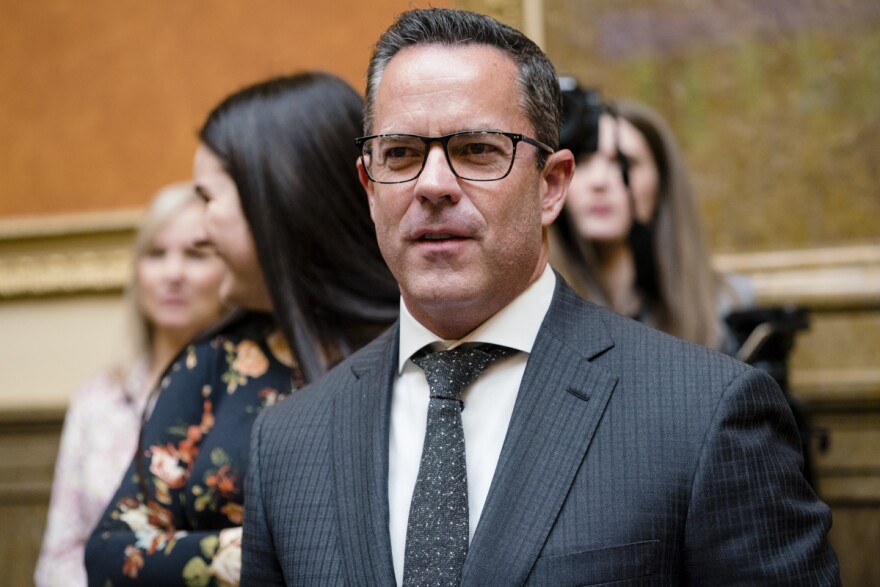Utah’s general legislative session begins next week. That means until mid-March, lawmakers will be debating and voting on bills that could affect Utahns.
KUER’s political team, Nicole Nixon and Sonja Hutson sat down with House Speaker Brad Wilson to get a preview of this year’s session.
This interview has been edited for length and clarity.
Nicole Nixon: Utah's population is booming, and you said last year when you took the gavel that planning for growth was a priority for you. What's the number one thing that the Legislature has done in the past year to plan for that growth?
Brad Wilson: Last year we invested, I think it was close to 1.6 billion or 1.8 billion [dollars] in public infrastructure around roads and transportation.
We invested a very, very small amount into building up our recreation assets in the state. Most of our growth here actually comes from our own kids and grandkids [EDITOR’S NOTE: Utah’s fertility rate is at an all-time low and growth is driven by people moving into the state], and we just don't have as many places to go anymore where we can go and enjoy a hike or go cross country skiing or enjoy some time out in the wilderness.
We're kind of overrunning some of those assets, and it's not necessarily tourists, especially approximate here to the Wasatch Front. It's us! And I would really like to see us continue to build on that recreation asset and that infrastructure so that all of us can continue to enjoy the quality of life that we've got. We started some of that last year, and we're going to keep keep building on it.
NN: What does that look like? Is that funding for state parks? Is that setting aside areas of public lands?
BW: It could be any number of things. Obviously, we've got wonderful state parks, and how do we continue to invest in those so they can grow based on demand and the need of residents.
We can as a state actually preserve open space. Now, it might mean we have to acquire some of it or buy some of it, which we could do. Or there might be some we could preserve as we do land swaps with the federal government. There's a tremendously long list of options available to us.
But one of the challenges is we actually haven't had a really coordinated strategy as a state of how we're going to manage that, and I think it's important that we have a conversation about what is our strategy as a state to protect that quality of life component we enjoy so much.
Sonja Hutson: One of the pinch points of the growth that we've seen here in Utah is housing, and there's a bill from Sen. [Jake] Anderegg [R-Lehi] this session that would allocate $35 million to affordable housing projects. Similar bills have not been well-funded in the past. How likely is that bill to get the full $35 million it's asking for?
BW: We are seeing an affordability crisis in the state. It’s actually the industry I work in, so I have a front row seat to how much housing is costing and it amazes me. We see townhomes now costing more than single family homes cost just a few years ago, and I worry for my kids, where they're going to be able to live. It’s really supply and demand, and we have more demand than supply. We need to help address that, but do it in the right way.
If we're going to use public dollars — taxpayer dollars — to address this issue, one of the things that the public should expect us to be able to ensure is that we're using those dollars wisely and we're leveraging those dollars to have as much impact as possible. Funding is obviously the critical component of it, but we've made some progress over the interim and I feel like we're in a better position to feel like those tax dollars will be used in the way we want them to.
NN: So we have to ask about the tax reform bill and this referendum effort. You and other lawmakers very much pitched this as a tax cut for Utahns. So how do you respond to people who've done their own math on their household budgets and just don't see it adding up?
BW: I'm sorry they don't see the big tax cuts that they'll be getting because 86 to 87% of the households in this state will pay less taxes to the state of Utah. Yes, we'll be paying a little bit more in some gas and grocery taxes, but big tax cuts for seniors on their social security benefits and big income tax rate reductions. Plus, we're sending out about $90 million of one-time money to people in rebates. So, it is probably the second largest —, if not the largest —, tax cut in state history.
SH: The tax reform bill included taxes on some services like ride sharing, Netflix and dry cleaning. Are there plans to add more services like that this year?
BW: I'm not aware of any plans to update the tax code beyond what we did. We just did a massive tax cut and reform so we can pay our bills in the future. I don't feel like there's a great sense of urgency on anyone's mind to continue with tax updating right now. But we will see. I mean, we've got 104 lawmakers and they can open bills on anything they think is a priority for their constituents.
Nicole Nixon covers politics for KUER. Follow her on Twitter @_Nixo


